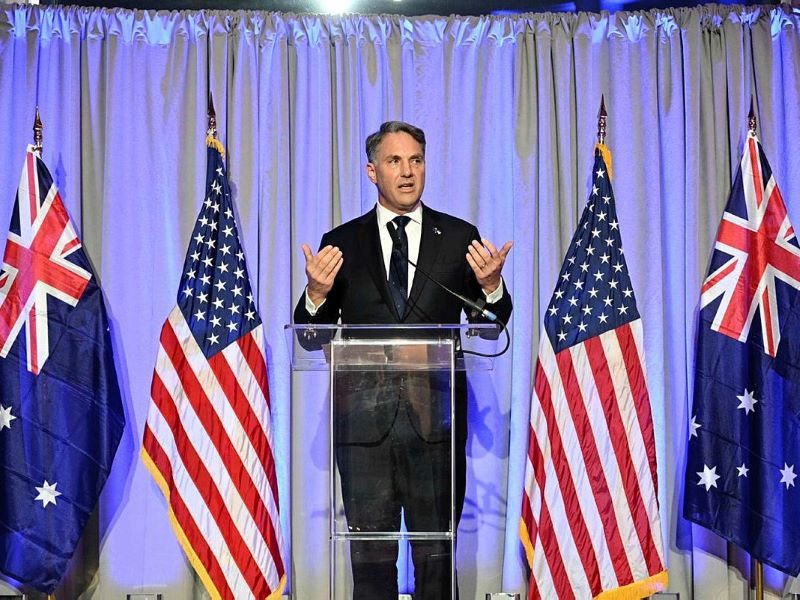The technological capabilities and innovation ecosystems stemming from Australia’s AUKUS agreement will be “more consequential” and arrive much sooner than the multi-billion-dollar nuclear powered submarines the new alliance is based around, according to a new report.
The report, from the University of Sydney’s United States Studies Centre, recommends a thorough, whole-of-government analysis on Australia’s areas of comparative advantage and gaps to take full advantage of the security pact.
“The decisions that the government takes now on AUKUS and the arrangements they put in place on technology cooperation are going to have implications for decades, not only the years to come,” report author Jennifer Jackett said.
“If we can get some of these reforms right in terms of the way we do defence innovation, the way collaboration happens between government, industry and academia, that has transformative potential in terms of the outcomes that we might see for defence from a capability standpoint, but also more broadly in strengthening our science and technology base.”
The call comes as Defence minister Richard Marles announced a decision on what type of nuclear submarine Australia will acquire will be revealed in early 2023.

While Australia’s acquisition of nuclear-powered submarines is the key plank of the AUKUS pact, it also includes advanced capability development commitments for quantum, cyber, artificial intelligence, undersea, hypersonics and electronic warfare.
The capabilities Australia eventually acquires or expands in these areas and the research and commercialisation ecosystems built around them will have a bigger impact on the nation’s security and prosperity than the submarines grabbing most of the attention, Ms Jackett said.
“The opportunity that AUKUS advanced capabilities cooperation presents for Australia to bolster its high tech ecosystem,” she told InnovationAus.com
“Australia already has many strengths in its innovation ecosystem, especially when it comes to basic and foundational research and in some very strategic areas like quantum computing and artificial intelligence. But there are also real challenges like commercialising that research.”
Ahead of his visit to the US this week, new Defence Minister Richard Marles agreed the non-submarine technologies may end up being “just as if not more important” in terms of what AUKUS ultimately delivers.
Ms Jackett’s report, which was funded by a Department of Defence grant, investigates what needs to happen to take full advantage and makes several key recommendations, starting with gaining a better understanding of Australia’s comparative advantage, complementarity, gaps and overlaps with US and UK high-tech ecosystems.
This could come through a review and would likely be Defence led, Ms Jackett said, but must include representatives from across government, academia and industry.
Similarly diverse delegations for each advanced capability areas should travel to the US and UK to gather and share information,
“That’s a really urgent first step in a sense,” Ms Jackett said.
“We should get the right people together on each of those technology streams, travel to the US and UK [to] talk about what Australia brings, understand the landscape overseas, and then use that to inform a prioritised agenda moving forward for the AUKUS partnership.”
A clearer picture on strengths and gaps is needed, Ms Jackett says, because Australia will have to make tough decisions on the capabilities it leads itself and where allies will take the lead.
“All of the technology areas are going to be important and significant in terms of their potential military applications, but some of them are still being tested, hypersonic weapons for example, and quantum technologies — they’re still years away in terms of being a scalable, readily available technology.”
The report also recommends an annual “Defence Innovation Dialogue” should also be established for agency heads to share best practice for defence research and commercialisation, while AUKUS could also be used to support the establishment of the new Labor government’s Advanced Strategic Research Agency (ASRA), set to be modelled on the US’s longstanding DARPA.
In addition to the planning and cooperation recommendations, the report calls for the establishment of secure high-tech research precincts for each AUKUS advanced capability stream, and a new “AUKUS visa”.
Australian researchers and companies at the cutting edge of the capability areas have also welcomed AUKUS as a potential multiplier effect on local industry, and urged similar strategic planning for Australian organisations to get maximum benefit.
Do you know more? Contact James Riley via Email.

